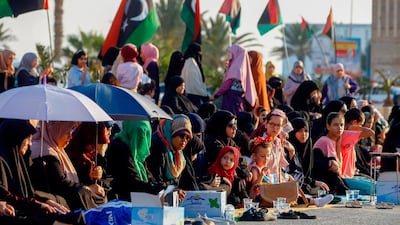French military deployments in Libya have run counter to international aims, an Italian foreign ministry official has said, as fighting continues to plague Libya.
Italian foreign ministry undersecretary Manlio Di Stefano told The National that while France and Italy cooperated as partners on Libyan issues, in practice, things were often "not going in the right direction".
Of particular concern was the discovery of French weapons in camps abandoned by Libyan National Army (LNA) forces, the undersecretary from Italy’s populist 5Star Movement said, during a 20 minute interview in Rome.
Since April, the LNA, led by Field Marshal Khalifa Haftar, has been fighting to take control of the capital.
The LNA supports the eastern government in Tobruk, and Field Marshal Haftar says they are fighting terrorism. The UN-backed government in Tripoli has no forces of its own but is supported by a range of local militia.
The US-made Javelin anti-tank missiles were discovered when fighters loyal to the Tripoli government retook Gharyan, a southern suburb of the Libyan capital. French authorities said in July the missiles were left by a counter-terror squad during operations in Libya and were no longer operational.
Despite the explanation, Mr Di Stefano remained concerned that France was not coordinating its efforts in Libya. “We have discovered French movements in the country that were not aligned with the general agenda and the general strategy,” he said, referring to the reports of military deployments in Libya.
The government in Tripoli has claimed French operatives have supported the LNA.
Mr Di Stefano called on the international community to continue pushing for a ceasefire in Libya and warned that further chaos would be unleashed if a sustainable solution to the violence was not reached. “We are really working in a crystal clear way to avoid this and reach the ceasefire,” he said.
In response to the Mr Di Stefano's remarks a French diplomatic source told The National France had continued to work with its European allies in Libya. "As agreed, regarding the situation in Libya, France works closely with its partners, particularly European," she said via email.
On Sunday the UAE, alongside the US, UK, Egypt, France and Italy, welcomed the declaration of a UN-backed truce near the capital to mark Eid Al Adha. "We call on all parties to start working with no delay on a ceasefire agreement and resume efforts, under the auspices of the Special Representative of the United Nations, to build a lasting political solution," the five nations said in a joint statement.
Fighting restarted following the two-day truce, The Associated Press reported, with airstrikes carried out by the LNA on the southern outskirts of Tripoli. Fighters loyal to the UN-backed government also shelled positions held by Mr Hafter's forces in response.
The UNHCR has said 105,000 people have been displaced in fighting near Tripoli since April. Over 1,000 people have been killed in the clashes. The UN’s refugee agency also warned that its relief aid could only reach 2,300 of the 21,000 families forced to flee their homes.
In recent years, Italy has been on the frontline of Europe’s migrant crisis, with the overwhelming majority of migrants arriving via Libya. Mr Di Stefano said further displacement in Tripoli would have a direct effect on Italian shores across the Mediterranean. “Now the crisis is too much. If you involve Tripoli in the war it means something dramatic for the whole of Europe,” he said. “This is going to be the worst crisis that we ever had in the North of Africa and we want to avoid it.”
In response to ongoing arrival of migrants to Italy from Libya, which Rome still views as an emergency, the country passed a new law last week introducing fines of up to €1 million (Dh4.1m) for rescue ships operating in the Mediterranean.
Italy’s hardline interior minister, Matteo Salvini, who has built his reputation by exploiting anti-immigrant sentiment, spearheaded the legislation, which also allows authorities to confiscate migrant rescue ships if they enter Italian waters.

